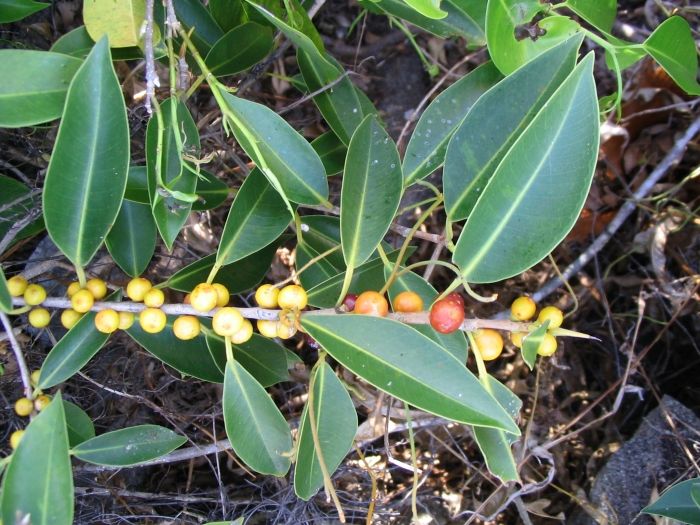Small-Leaved Fig
(Ficus obliqua)
Small-Leaved Fig (Ficus obliqua)
/
/

coenobita
CC BY 4.0
Image By:
coenobita
Recorded By:
Copyright:
CC BY 4.0
Copyright Notice:
Photo by: coenobita | License Type: CC BY 4.0 | License URL: http://creativecommons.org/licenses/by/4.0/ | Rights Holder: coenobita | Publisher: iNaturalist | Date Created: 2004-08-23T15:50:13-07:00 |





















Estimated Native Range
Summary
Ficus obliqua, commonly known as the Small-leaved Fig, is an evergreen tree native to rainforests and coastal forests in eastern Australia, from Queensland through New South Wales and down to Tasmania. It can grow up to 60 feet (18 meters) in height with a dense, spreading canopy that provides significant shade. The Small-leaved Fig is characterized by its glossy green leaves and small fruits, which mature from green to a dark purple, attracting a variety of birds and wildlife. The tree’s bark is smooth and gray, and it develops a distinctive buttressed root system with age.
The Small-leaved Fig is valued for its adaptability to different soil types, ranging from sandy to loamy, and its ability to thrive in both full sun and partial shade. It requires moderate watering and well-drained soils. In cultivation, it is often planted in large gardens, parks, and as a street tree for its ornamental value, shade provision, and ecological benefits, such as supporting local fauna. It can also be used for creating a natural privacy screen or windbreak. While generally disease-resistant, it can suffer from root rot in poorly drained soils and may become invasive if planted outside its native range due to its aggressive root system. Gardeners should be cautious about planting it near structures or pavement to avoid damage from its roots.CC BY-SA 4.0
The Small-leaved Fig is valued for its adaptability to different soil types, ranging from sandy to loamy, and its ability to thrive in both full sun and partial shade. It requires moderate watering and well-drained soils. In cultivation, it is often planted in large gardens, parks, and as a street tree for its ornamental value, shade provision, and ecological benefits, such as supporting local fauna. It can also be used for creating a natural privacy screen or windbreak. While generally disease-resistant, it can suffer from root rot in poorly drained soils and may become invasive if planted outside its native range due to its aggressive root system. Gardeners should be cautious about planting it near structures or pavement to avoid damage from its roots.CC BY-SA 4.0
Plant Description
- Plant Type: Tree
- Height: 65-130 feet
- Width: 10-20 feet
- Growth Rate: Moderate
- Flower Color: N/A
- Flowering Season: Fall
- Leaf Retention: Evergreen
Growth Requirements
- Sun: Full Sun
- Water: Medium, High
- Drainage: Medium, Fast
Common Uses
Bird Garden, Edible*Disclaimer: Easyscape's listed plant edibility is for informational use. Always verify the safety and proper identification of any plant before consumption., Low Maintenance
Natural Habitat
Native to rainforests and coastal forests in eastern Australia
Other Names
Common Names: Small-leaved Fig, White Fig, Variable Fig
Scientific Names: , Ficus obliqua, Ficus aphanoneura, Ficus backhousei, Ficus boothiana, Ficus elegans, Ficus eugenioides, Ficus eugenioides, Ficus graeffii, Ficus laevis
GBIF Accepted Name: